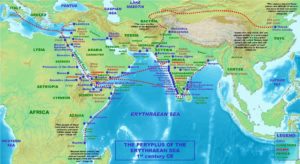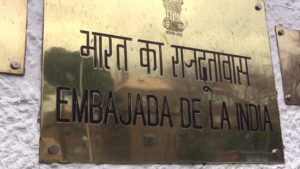 -Your Excellency, every country has companies that are flagships, that are strategic to the country, in India there is a company, Adani Group, which has recently been the victim of allegations by Hinderbur Research, an investment group, and these allegations seem to be attacking not only the company but also the country of India. What is your opinion on this?
-Your Excellency, every country has companies that are flagships, that are strategic to the country, in India there is a company, Adani Group, which has recently been the victim of allegations by Hinderbur Research, an investment group, and these allegations seem to be attacking not only the company but also the country of India. What is your opinion on this?
The Adani Group is a very good company which has done very well in India. The job of any country is to help its companies to do well. I've heard about the report, the Hinderburg report. We've seen the accusations. It is all in the media right now. There has been no study done on whether the accusations are correct or not correct. But as government our job is to make sure that our markets do not suffer, that the politics don't suffer, that trade doesn't suffer, that business doesn't suffer.
Because the Adani Group is associated with many other companies, it’s a huge economic group. So anything which hurts the economy of Adani will naturally hurt the economic interests of all people related to that company. Our job as government is to make sure that it does not hurt people, and that it does not waste economic resources. That is our first theme.
Whatever is happening on the Adani Group... it's a private enterprise. It has to handle it by itself. Is not the government who has to decide whether it is important or not. But for anything that affects the economy of our country as a government, we are responsible. We have to make sure that it does not affect the economy of our country, and this report has affected the economy of India
-However, the country's political opposition has taken up the issue as its own. They are using it to create parliamentary controversy.
Yes, that is the job of the opposition. They have to find issues on which they can ask the government for an inquiry into issues that are being done. But we have a lot of institutions in India that handle this kind of things; you have the Security Exchange Board of India, you have the Codes, you have the entire institution for looking after all these things. Let them look at it. Parliament comes at a much latest stage; Parliament comes when you have found that there is an issue for which there is the government´s blame. But let first the institutions, a democracy is known by its institutions. All its institutions have to be given equal importance. You cannot give one institution the importance of the other. So let the inquiry be done by the authorities who are responsible for these themes. So let them look after it, which is a security exchange board of India, and let the courts look after it. This is a private enterprise like I said. The government´s job is to make sure that anything that happens to the private does not affect the rest of the economy. We are sure that we are handling it the right way. A parliamentary inquiry, if it comes later on, we will look at it.
-As you said, Adani is a very important group in India. Has the current situation had any macroeconomic impact on the country?
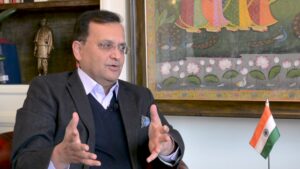 It has affected. The Adani group has lost a lot of value. The stock exchange has lost a lot of value due to that. That is a reason you have sanctions in the world; you target companies because it affects the country. Whenever you target any company in India it will affect the Indian economy. It will affect the macroeconomic situation of the country. The government's job is to ensure that the economic security of the country is taken care of; it is not about the company. We are not here to protect Adani or to protect any other company, we´re here to protect the economy of the country. So when any company in India gets attacked, we want to make sure that it doesn't affect the rest of the country.
It has affected. The Adani group has lost a lot of value. The stock exchange has lost a lot of value due to that. That is a reason you have sanctions in the world; you target companies because it affects the country. Whenever you target any company in India it will affect the Indian economy. It will affect the macroeconomic situation of the country. The government's job is to ensure that the economic security of the country is taken care of; it is not about the company. We are not here to protect Adani or to protect any other company, we´re here to protect the economy of the country. So when any company in India gets attacked, we want to make sure that it doesn't affect the rest of the country.
-Adani, however, has particular strategic importance for India. The group has recently managed to take control of the port of Haida in Israel. What strategic importance could this have for India's trade?
This is a very important question because today we are in a global world. Multinationals work in all countries. How is a multinational related to the strategic importance of a country? The US has hundreds of multinationals, and Europe has so many multinationals. Big multinationals which grew in India are working in Spain; Spanish ones are working in India. Indian companies are working all over the place. These are not just strategic in business terms; they’re also important for a country's outreach.
So there is always a strategic part of it, but there is no strategy as there is a defense strategy or a security strategy. It is a business strategy, to expand your operations. When Dubai World takes ports in different countries or when a Netherlands company takes ports in Spain... There is a business aspect to it. The strategic aspect happens automatically, it is not something that you plan for.
-There is another issue, seemingly in sync with the Adani issue. It's the BBC documentaries on the Indian president, who is accused of involvement in racist riots. He is accused of being involved in riots of a racist nature. Do you think these accusations are against the president or are they directed against India?
The BBC documentary was done almost 20 years after the events happened, and it was based on a report by the British Embassy in India. Tell me if I make a report today on the situation in Catalonia, or Basque Country... and 20 years later you do a story saying that the Indian Embassy made a report. How credible is it? Is not credible. It's not my job to make a report. I am not an investigating authority in Spain. Same the British Embassy in India is not an investigating authority. The investigation has to be done by the institutions of the country. And in case in a country where the institutions have failed then the UN can come in; those are the legal bodies. Legal bodies are not an embassy of another country sitting there. They have no experience in Investigation; they don't go and do a proper investigation. The investigation was done by the Supreme Court of India, which is the highest body in the country. They constituted an investigation team, which went into it and did not find any blame.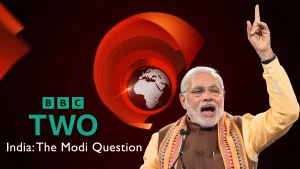
Now 20 years later you start doing it, it is something I find very strange. It assigns motives to question why was done now. What is the motivation? we will find out, but it is not something natural.
-Do you think this is an attempt by outside countries to break relations between society and its elected representatives?
I believe everybody wants to do the right thing in the world, but sometimes you´re motivated by people who are funding you, sponsoring you. There are many think tanks in the world; there are many media agencies in the world. Everybody is supported by somebody behind. We don't know what the real motive is.
-There is a very controversial person in the world, George Soros, who is very much linked to all globalist politics. He had made some rather cynical and pernicious statements about the president of India. Do you think Soros could be behind the attacks on the country's image?
George Soros is an individual who has his own ideas. There are thousands of individuals across the world that have different ideas, but the very fact that he is acting against a country. It is his motivation. George Soros has acted in the past in a manner in which he acts so that he makes more money out of it. He's a businessman. He's an investor; he's not a political person nor is he a person who has a reputation for being honest, free, or fair. A man like that when he makes an accusation it means that he has something to gain out of it. And these are dangerous people, who do things just for money but do not understand the ramifications, or the consequences, of their actions. These are very dangerous people. People have known George Soros. I think we all know what kind of man he is. My minister told very clearly, Minister Jashankar, about what Soros is. I don't think we should take him credibly or take him seriously in this matter.
-There really is a difference between investors and politicians. Narendra Modi is making an era of transformation in the country. By 2047 he wants India to be a fully developed country. You have made several appeals to the diaspora to collaborate in this campaign. What role do you think the diaspora will play in India's economic transformation?
This is a campaign started by my Prime Minister, Narendra Modi. We completed 75 years of our independence. In 75 years we have come a long way. From a very poor country in 1947 when we became independent, from a poor country impoverished by colonization with a very low GDP, no resources, no capital, no equipment, no industry, nothing. Today, after 75 years, we are the fifth largest economy in the world. But we still have a lot of poor people; we are still a developing country.
So my prime minister's idea is that based on our success of the last 75 years we should plan for the next 25 years. Something called “Amrit Kaal”, which it's like the “Golden Age” in which the government, the people, the business, and everybody, works together to ensure that not only does India becomes a developed country, but also takes its entire people with it. An inclusive development, where all the people, the poor people, and the people who are now marginalized, are able to increase their wealth, and prosperity, and reach a stage where they are comfortable and enjoying a good life. The whole idea is to work on this.
The role of the Diaspora, for many years, has been actively involved with India's development. But since Prime Minister Modi has come, he has increased the involvement of the Diaspora in Indian activities. The Diaspora today is a very integral part of India's development. They contribute not only with funds technology, manpower, and talent, but with everything, all resources. They also help in the growth of India abroad. So the Diaspora has been helping, there are many ways they do. There are five ways you can develop; you can give resources, you can give goods and services, you can give talent, you can give technology, and you can give funds. In all of that, the Diaspora is very well implicated in India
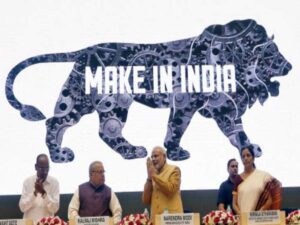 -There is a very interesting project being developed by the Indian authorities. It is the project "Make In India". What does this project consist of, and what are the guidelines for the implementation of the project?
-There is a very interesting project being developed by the Indian authorities. It is the project "Make In India". What does this project consist of, and what are the guidelines for the implementation of the project?
Made in India is another one of the brilliant campaigns by my Prime Minister. We are a very big country; we are now 1.4 billion, people the most populous country in the world. We've just overtaken China as the most populous country in the world, but this bigger country should make everything for itself, should be able to produce for itself, to have economies of scale in the country. But we found that we are such a big market, but we don't produce things ourselves everything.
So the whole idea of the Prime Minister was to allow people to make in India. So it is not “made in India” as much as “make in India”. So made in India is something which is made in India from the ground. We had the factory of the world which is China. But what we are saying is "make in India". If you want to sell to us make it here. If you want to do anything important, do it here. And it has made a lot of difference in the last eight/nine years of this government.
The amount of things that make India has gone up a lot. For example, with Spain; we have bought the C295 aircraft. We are buying from Airbus Spain 56 aircraft. This is a very big deal, about 3 billion dollars. It's a very big contract we have with Airbus Spain, but we have said that 40 of the planes will have to be made in India. The first 16 we will buy from Spain, but for the other 40, you have to make it in India. That's the whole idea; that you shift your engineering, your processes, your factories, and your systems, to make it in India so that we can create an ecosystem in India where things are made.
-As part of India's macroeconomic policies, the country is assuming the presidency of the G20. What are the proposals, or macroeconomic lines, that the country wants to present to the world?
The G20 presidency is by rotation and it has come to us this year. We take it very seriously because for us the G20 today is part of the reformed multilateralism that we are looking at. The multilateral system, which has been set up in the world, was set up after WWII. The UN, the Bretton Woods institutions, and all the multilateral system were set up after Second World War.
At that time there were only about 51 countries in the world, now there are 197 countries. At that time the winners of WWII were the ones who designed the multilateral system. Many of the important countries which have grown up now were not present at that time. We were not big enough, but today is a different world. So, we need a new multilateral system. And we think the G20, which represents 85% of the world's GDP, and more than 85% of the population also, is the body that represents very well the power structure of the world today.
For us, in the G20 our priorities are very clear. We will continue all the good work which has been done in the past, and we have added to it many other things, like for example reform multilateralism, sustainable development, women's empowerment, all the things that we think are important for the world to become a better place, where the G20 is the main organization today in the world, which is taking forward the multilateral system.
-Within the system created after the Second World War, there was a clear domination of the different currencies (dollar, pound, francs...). Now a new type of currency has emerged, such as cryptocurrencies. India is pushing hard for legislation to control these cryptocurrencies, which represent a bit of freedom from the system of dollar domination. Why does India want to control cryptocurrencies?
We don’t want to dominate cryptocurrency. Cryptocurrency is here. It's a very good system. It will go. But we want, like any other currency, the currency to be issued with the country's consent.
The problem with cryptocurrency is not that it is a currency, the problem is speculation. Any currency which becomes a speculation item then becomes in the hand of people who do not want good things, just want to be able to manipulate it. Look at the cryptocurrency Bitcoin; went up to 60,000 and fell to 2,000. I mean this kind of volatility, this kind of ups and downs, is not good economics.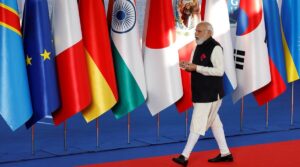
We need stable currency, like the dollar has been stable, there is a certainty system. So if you have to have cryptocurrency let the reserve bank, central banks of all countries, issue cryptocurrencies. When that happens currencies will naturally work like normal currencies. They are currencies the cryptocurrencies.
What we are looking at in Bitcoin and others, are speculative objects, speculative objects of value. We cannot actually call it currency, it is really not currency. They're speculative exchange coins, coins which you exchange. They are not currency as in buying and purchasing. If you want to regulate it you have to do it aimed to avoid speculation, aimed to be used for the purpose of FIAT, of exchange of goods and services. This is the whole concept of currency, isn't it?
-There is another interesting concept within the G20 presidency. Your minister of information and communications, Anurag Thakur, has commented that you are going to promote the cities of the future. What are these cities like?
We are a growing country, and if you look at all developed countries in the world, everything moves from the small villages to the cities. The cities become the center of development. Look everywhere; London, New York, Madrid, Paris, all the cities are important. We have to design the cities of the future. We have a huge population which are all moving to the cities, so we need something which is called “future cities”, or smart cities. Cities that can interconnect people, become a place for business, a place for culture, a place for arts, a place for innovation, technology, movement mobility, and everything.
The city is a vibrant entity; it’s like a living organism that supports the growth of a country. We have designed those cities. We want to design cities of the future, which take care of a population, give them opportunities, and a place where they can grow.
We started some years back, again Prime Minister Modi, the smart cities initiative. This is an initiative to make our cities smart grids; a place where everything from sewage to transport, to mobility, to food, to everything, can be done comprehensively in a sustainable manner. Doing it this way you have a very small carbon footprint.
The whole idea of cities was that. When Anurag Thakur talks about it, he's basically telling the world that today the New Frontier is India, where if you can put together smart sustainable cities of the future you will be creating future growth in the world. It's like what Spain has done, it's how you have used the European funds to build such a beautiful infrastructure. The same way we want to build, to take funds from countries which we are close to building this infrastructure in India.
-There is a very interesting aspect of digital cities, such as the digital economy, which is very much connected to cryptocurrencies. But I am talking about the UPI Paynow instant payment system, which has been developed in India and is spreading to many countries. How is this payment system structured and how important is it in India's international relations?
We talked about cryptocurrency. I told you one thing; currency is basically the exchange of goods and services, the way you do pay for it. For any underdeveloped country, or even developed, country, if you have an easy way of payment where your business becomes easy, trade becomes easy, relations... If have to send money to India it becomes easy. Do you have to send money from India to Spain? It becomes easy. The payment system is very important.
Right now, we have a payment system that is not digital, but the digital payment system has a chance of revolutionizing the entire industry. Today the cost of payment, which the banks take the exchange rate, stakes everything, is quite high. It's a big percentage of the money. So we are losing a big percentage of the money. Businesses are losing, because they're paying for payment systems. So in a digital system, it becomes much cheaper much faster, and much more reliable.
India started this new payment system called UPI, United Payments Interface, which today is the biggest payment system in the world, with 8 billion transactions every month, with more than 200 billion dollars of transactions staying in place every month. This is huge. Nobody else comes, China is number two, and it's way below.
It's the largest system in the world. What we want is systems integrated across the world. But everybody has their payment system; Europe has its payment system, China has its payment system, the US has its payment system, Japan... Everybody has payment systems. We want to integrate the payment system so that it becomes easy, seamless, and very affordable, to move money and funds across the world.
-How are the negotiations for Europe, from Spain, to be able to use UPI Payment?
We are speaking to them. A France company has taken it up, but like I told you, Europe already has its payment system. So what we are doing is linking up our payment system to them, so that if there is a trader in Spain who wants to pay for purchases in India can use the system. That way is no need for negotiation because all reserve banks and all central banks understand the importance of payment systems, so it is only a question of linking up the payment systems.
-There is a great deal of expectation about India's position, not only economically, but also geopolitically. India is one of the most important countries in the Global South. What are India's objectives within this group?
We have always been a very important member of what we call the global South. For us, the most important aspect of our foreign policy, of our geopolitical vision, has always been something called strategic autonomy. Strategy autonomy does not mean strategic ambiguity. Strategic autonomy means independence of decision making, to be able to decide on our own what we want to do. So we were under developing country, but we wanted strategy autonomy. We are not a developed country, which wanted strategy autonomy.
We started, remember, in the early years 50s and 60s the non-aligned movement. Because the cold war was going on we did not want to be either with the U.S. or the USSR. We started with a group of countries called the non-aligned movement, and today the non-alignment has more than 140 members. It's a very big movement. We have changed over the years. We realize that non-alignment is not the solution. The solution is what my Prime Minister calls multi-alignment, where you do align with many countries at the same time. For us, this ability to be multi-aligned was important, and among one of the alignments is our leadership of the Global South.
The global South is looking for leaders, for models of countries that have grown from poverty to development, but through democratic means. Through means which are the rule of law, and human rights, through the right way. India is a classic example of a country that has, despite its poverty, its backwardness, and its non-industrialization in the beginning, destroyed by colonialism, in 75 years overcome all that remain the democracy, and become a successful country. So we want the Global South to learn, share, and exchange best practices within the Global South. For us, the global South is a very important aspect of our journey towards prosperity.
-Recently the Indian government hosted the "Voices of the Global South Submit for the human center development" event. Neither Pakistan, China, nor Brazil had been invited...
Brasil no?
-No, Brasil neither…
Well, I have I don't have information about this, but listen; It's a global South and we invite everybody who is part of the global South. Whit China and Pakistan I can understand, we probably have some political security issues with them, but I'm surprised at the others. It is a very surprising thing. But for us, it's very important all of us in the Global South. We Share the same values, and the same kind of aspirations for a better future, and we want to use resources, talent, and technology to grow. The title says it is a role of the global South in human-centric development; for us that is important. I am surprised at this but if I find information I'll let you know.
-Another very important issue is that India has presented itself to the world as a technological powerhouse through AeroIndia 2023. At the air show India has shown its maximum production capabilities, it has shown what its alliances are for the generation of fighter, commercial, and other aircraft. What have been the country's main changes in the sector?
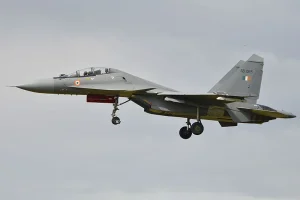
We did not have a very big aerospace industry. We want the aerospace industry. Three things happen here; number one, my prime minister's vision of "make in India", we want things to be made in India, very important. We are a big market and we wanted to be made in India. Second; we want the latest technology from across the world, we want them to come and make it in India. Third; we also want to be self-reliant in equipment, military equipment, whether it is military planes or fighter jets.
We want to be self-reliant because we have realized over the years that being reliant on one or two countries is very difficult. In the beginning, many Western countries denied us technology, so we could not buy from them. But now they are all offering us technology. So for us is the right time to set in an aerospace industry of our own, and we are doing that. We are already producing. We are outsourcing a large amount of production for Boeing, Airbus, Embraer, for everybody now. We are telling them “You come and make it in India”. As I told you, the contract we have signed with Spain for the 56 aircraft, has a large component of Make in India. So this is what we want to do to become a global power in the aerospace industry.
-Who are your main partners in the aerospace field?
We have all companies, all kinds of companies, and all members, of all organizations. Aerospace has 3 aspects; one is civilian aircraft, one is military, and the other is space.
On military aircraft, we had an old agreement with the Soviet Union and Russia, in which we play manufactured MIG planes in India but they were basically assembly.
Now, we are looking at the aerospace industry of manufacturing civilian aircraft in India. We've just given an order for 500 planes, which is one of the biggest orders in the world.
Aerospace in the space, we are doing very well. We have one of the biggest space programs in the world. We are putting satellites of every other country. We put satellites of Spain... our Space Program is one of the most developed in the world and it is very low cost. In fact, is one of the things people tell about. Do you know the cost of the film Interstellar?
-I don't know right now.
It´s a movie made in Hollywood. The cost of making that movie is more than the cost of the rocket we launch to space.
-That is really optimizing resources.
We are very cost competitive. We are one of the best quality low-cost Space Programs in the world.
-Apart from its good aerospace relationship with Russia, India has signed an important technology collaboration agreement with the United States; iCET (initiative on Critical and Emerging Technology). What does this project with the United States involve?
For many years, because of two reasons; our leadership of the non-alignment movement, and not being along with the Western countries, and also because we were reliant to a large extent on equipment and technology from the Soviet Union, the West denied us a lot of critical and emerging technologies. There was a denial regime. Do you understand what a denial regime is? Where you deny technology to others.
But over the last 20 years or 25 years, and especially in the last 9 to 10 years, we have reached a very close level of comfort with the West. Today the USA is one of our closest Partners, and they want us to have the critical technologies and emergent technologies, which did not give us in the past.
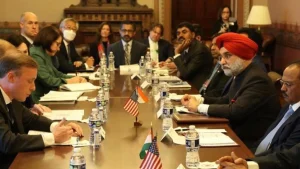 The signature of the agreement shows that the US is now willing to exchange and partner with India on critical and emerging technologies. So this is very important because by getting the technology, we have to add the willpower, and the manpower, to be able to do it. We need the technology and the funds to be able to develop India into a technological hub of the world.
The signature of the agreement shows that the US is now willing to exchange and partner with India on critical and emerging technologies. So this is very important because by getting the technology, we have to add the willpower, and the manpower, to be able to do it. We need the technology and the funds to be able to develop India into a technological hub of the world.
-These agreements clash diametrically with US interests in the geopolitical arena, because India has very deep military and technological agreements with Russia. Because India has very deep military and technological agreements with Russia. What similar agreements do you have with Russia, and how can they collide with the US?
This was something in the past when technology was denied to us. We had to go to the country which gave us. We are thankful to Russia, we have a good relationship with Russia, and we are thankful that they gave us equipment and technology at a time when we were facing a lot of problems with our neighbors, Pakistan with China. The Russians came to our assistance Today we have a good relationship also with the West.
And I think both sides understand our compulsions. India´s New Vision is multi-alignment. We will align with all countries of the world but only on interests that are shared between both of us. For example, we are a member of the BRICS, where we are Brazil, Russia, India, China, and South Africa, we are here in the BRICS. We are also in the QUAD where there is the US, Japan, Australia, and India, so we manage both relationships very well. We keep both relationships open and transparent. They understand that what we are doing is not against anybody but for the organization. We work in a positive spirit to ensure that we are a force for good in the world, and that we bring positivity to any organization that we join.
-It is a way of maintaining geopolitical balance.
-Exactly
-There is a geopolitical situation now that India is benefiting quite a lot from, which is the purchase of oil from Russia. Purchases of crude oil from Russia have increased by 32% this year. This is supposed to reduce energy costs in order to produce domestically. Has this drop in prices been felt in the development of domestic production?
We are dependent on oil energy from abroad. We import almost 80% of our energy. When the war started, before the war on Ukraine, our purchase of Russian oil was only 1%. After the war, when the price increased, a war in which we had no role, we had to find where the energy was the cheapest.
It's like Europe. Even when Europe was fighting the war, it was still buying energy from Russia, because you had to go where energy was cheap, because you have to take care of your people. We have 1.4 billion people who need energy, who needs support. So we went to Russia, we bought Russian oil, which was coming at a discount, so we could save money, and we bought a large amount. Today we have almost 20% of our revenue, I mean from purchases coming from Russia. So in a sense, we had to do it for economic considerations. We will do it whenever any situation happens. Where our interests, our people’s interests, are crucial, the government will always take action to ensure that it is done.
But overall, in the long term, the economic benefit it's the same. We have the refineries whether we get Russian crude, or we get Saudi crude, or we get Nigerian crude, or we get any other crude. The refiner remains the same. We need them for ourselves more than anybody else. So, technically, there has been no economic development because of the tip oil. The tip oil is because we need it to make sure our refinery is run at a reasonable cost.
-At the same time, energy from crude oil is controversial. An energy transformation seems to be underway. India, together with Russia, is building several nuclear power plants. Does India consider nuclear energy as green energy?
Yes, we consider. I'm convinced that nuclear energy is a green energy because it has very little environmental impact. In the past, the technology was not good enough, so there were problems with the disposal of waste, there was danger as Fukushima happened, Chernobyl, or Three Mile Island, but those dangers are not there anymore.
Nuclear energy is one of the most environmental energies... But it is not cheap, because there's a large amount of investments to be made in the beginning. In the long run, it is cheap, but in the beginning, you have to put in a huge amount of investment. For poor countries, it is not an option. But for us, it was important because we are sitting on large amounts of coal. Solar and wind are there, but we need a large amount of green energy to move the energy transition to the next level. We will use all kinds of energy; solar, wind, tidal, nuclear, and all possible energy. In nuclear, we are open to the world. We found that in the beginning, we could not do much with our expansion of nuclear. Nuclear energy was limited because we were not members of the NSG, so we could not get it because we do not sign the NPT.
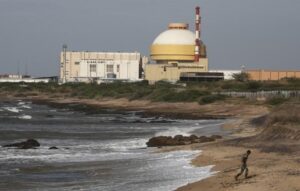
We had decided not to sign the NPT because we found the NPT discriminatory. It allowed some countries to keep nuclear weapons, and some other countries not to. So we thought it was discriminatory and we never joined. But our action as a country on nuclear proliferation was better than many countries of the NPT, so that is a reason the NSG gave us a waiver. The U.S. led it, and all countries in the world agreed, that India’s performance in nuclear proliferation has been exemplarity and that India needs an exemption to be able to trade in nuclear technologies. So we opened up our doors to building nuclear power plants in India. Everybody came; the Russians came, the Americans came, the French came, everybody who had nuclear capacities. Everybody is doing it; the Russians are doing Kudankulam, the French are doing other places, and the Americans are doing it as well, so everybody is there in India, and we consider nuclear energy important.
-So they are going to boost it in the future?
Yes, of course
-In the green energy sector, a huge lithium deposit has been discovered in India, apparently for the second time discovered. It is located in the Kashmir region. Despite the importance of the find, some experts question the country's capacity to extract the mineral. Does India have the necessary technology to extract the mineral?
Yes, technology is easily available. Lithium mines are all over the place. Technology is not difficult. Lithium is a very important component of batteries, and if you have to do an energy transition, you need batteries, support batteries. Lithium is a very important aspect for us. Technology to take the mineral it's very easy. That is not an issue. It's a minor issue, it's not rocket science. It's something easily available, and we have the capacity to do it.
In Kashmir it's a mountain terrain, so we are building infrastructure around it. It´s necessary to be sure that it is done in a sustainable way because Jammu and Kashmir is in a very good ecosystem. Ecological conditions are excellent out there, and we do not want to destroy it by mining a forest area. We will do it in a sustainable manner, in a manner in which we will make the least disturbance to the environment and maximum benefit to our economy.
Will lithium be used to create a fully-fledged clean energy production facility?
Yes, that is what we are looking at. For clean energy you need batteries, and lithium is a very very important element of batteries. Actually, very few countries have control over lithium; China, Argentina, in Africa... so for us to have our own lithium production would be very very good.
-Moving on, there is a very interesting geopolitical situation in relation to India; its maritime security. There are several international agreements, but it seems that none of them provide solutions to the country's security problems. Why are AUKUS and QUAD not providing solutions to security in the Indian Ocean?
First, understand one thing; the Indian Ocean is the only ocean named after a country. It's India; we sit right in the middle of the Indian Ocean. Security of the Indian Ocean is our first prerogative. We do Alliances with other countries to make sure that everybody works peacefully for the security of the Indian Ocean.
And we have very good relations with the French, with the Americans, with every other person who is active in the Indian Ocean region. With China, we have some problems, but we do not have an issue with China as long as they do not try to compromise the security of the Indian Ocean. But the Alliances, the QUAD is not a security Alliance; it's an alliance of democracies, on values, and we are working on a lot of issues. Security is one issue, but it's not the main reason. India is not part of AUKUS, but AUKUS security relation is there for the safety of the Indo-Pacific. These are all Alliances. As I told you today, the world is about multi-alignment.
You align with all countries to ensure that your region, your area, is secured and free from any disruption, or any outside element that wants to create disruption. So for us, we are clear; the Indian Ocean security is ours. We take it seriously; it's a big responsibility for a poor country. It's the biggest responsibility because we need a lot of resources to manage such a big ocean. But in collaboration with partners, in cooperation with our partners, and with countries with which whom we share similar values, we are sure will be able to provide security to the region.
 -India has recently joined another new multilateral partnership, and many voices are saying that it can be the solution to Indian Ocean security. I am referring to the partnership with France and the United Arab Emirates.
-India has recently joined another new multilateral partnership, and many voices are saying that it can be the solution to Indian Ocean security. I am referring to the partnership with France and the United Arab Emirates.
This is the same thing; my minister’s vision of India is being a multi-aligned country, a country that aligns with anybody with whom its shares a common interest, and common values, for the mutual benefit of the alliance. So we have the QUAD, which is an alliance; we have the trilateral with many other countries, with Japan we have trilateral, with the UK we have trilateral, with many other countries we have trilateral groups. Now with UAE, India, and France, there are groups that will work together; France, UAE, India... We share similar values; we want the protection of the Indian Ocean. We find that we need to do everything from illegal shipping to anti-piracy in Somalia, to deep sea mining to everything that we need in the region
We work together. It is important. The future is about multi-alignments. It is not about one against another. There is no black and white.
-There is one bilateral relationship that India is unable to solve through multiple alliances. It is its relationship with China. In recent months there have been various border disputes, but recently India has accused Beijing of violating various agreements. What agreements, in India's eyes, has China violated?
For many years Indian and China has been negotiating the border agreement. We have a huge border, which is disputed by China. We had a series of meetings to regulate the border. There is an informal agreement between both sides; while the discussions are on we will not try and disturbs the border, and we will not take any action which will change the status quo. While we were discussing China violated the document by coming into areas which had had never come before. China entered our territory in Galwan. Before that, they went into Doklam, in many other places they have done it.
They do it it's because it is something that China does, like in the South China Sea. First, they said; these islands... we will not go there, then they reach there. Then they said “We will not build any ports”, then they build ports there, then they said “Will not have an activity”, and now they have all activity there.
The Chinese have a thing called “Salami Technology”. One by one, slowly, they keep on going. Before you realize they have created an entire structure. For us, this was clear. We had to stop it. So we moved a large number of resources to the border, to be able to tell the Chinese that if you try anything we are also ready for it.
It's not easy for us. We are, as I told you, a developing country, and to be able to put so many resources into fighting unnecessarily is not something we want. We want a peaceful border where we can work together, do border trade, and work for the development of both countries.
-One of China's industries on the border could have a major ecological, industrial, and economic impact on the region. It is the water project on the Brahmaputra River, which flows into the Ganges. This is a water project that will be much bigger than the Three Gorges project. Does this situation not lead to the creation of a joint or multilateral action protocol?
Every river in the world has something called upper Riparian Rights and lower Riparian Rights. A river has countries that are on the upper side and countries which are on the lower side; both have rights. You are supposed to discuss between yourselves to ensure that the normal amount of water goes, that during the rainy season, more water does not come down. It's a regulation that is done by countries together.
The Danube is a classic example in Europe, where all countries work together to ensure there is a common flow in the Danube. The same is in the Nile River. Wherever there is no agreement war takes place, because it's a very sensitive issue.
With the Chinese we have told clearly; for any action you take as an upper riparian country you need to sit with us and talk to us so that we can plan it out together. We don't want to beat out the projects. We want to make sure that we can plan in such a way that it is beneficial for both countries. The river is one; there are people in the North and people in the South, and people in the Upper and Lower, which creates an issue. We need to work together. On this, I'm hopeful that the Chinese will understand the importance of this project and will be able to work with us.
-What would be the ideal solution for India on the borderline?
The problem with the frontier is national, is a very emotional issue. Look at China; China has resolved all its frontier issues with all countries, except India. China has resolved to respond to issues with Russia, Vietnam, Laos, with any other country in its frontier it has been resolved.
There is a political question here. We fought a war in 1962. We have a competition and cooperation relationship. The Chinese have to understand that this kind of situation, where we do not resolve a border, is not good for both countries. We have been talking for a long time in the past. We are willing to talk further to come to a solution. The problem was in the past.
We decided that we have some problems and some areas in which we have common interests. We decided with China that we will move ahead in the areas in which we have common interests, and we will keep up problems aside to solve later on. We will not allow our problems to interfere with our common goals.
But after what has happened in the recent past we have realized we cannot have the same attitude with China anymore. So now we are saying; you first resolve the problems and then we will go to the one service which can work together.
I hope China understands because both China and India have a big contribution to gift to the world. If we are in competition and with hostilities it is not good for the world. We should work together.
-There is another country with which India often has friction, a secessionist part of India, which is Pakistan. It seems that this time India has taken the initiative in initiating hostilities. India has unilaterally revised the Indus Water Treaty. What was the reason for this unilateral decision on a matter that was governed by the World Bank?
The Indus water treaty itself says that you can revise it from time to time if it does not satisfy both parties. We have realized over the last many years that the Indus Water Treaty was a discriminator treaty. It gave us fewer rights and more rights to the other side. It did not allow us to do socioeconomic development in the upper parts of the Indus.
We decided to start to revise the Treaty, to make sure we can talk. We've been telling Pakistan for a long time; let's discuss these issues. Unfortunately, Pakistan links everything to one goal.
And they did not want to discuss this with us, so we had to unilaterally take action to take this step. We first wanted to discuss it with them, but if they don't want to discuss we have no option but to take the first step by unilaterally revising
-President Modi had said that not a drop of Indian water for Pakistan.
That's a political issue, we are sure about that. We do not want to give anything to Pakistan which is not part of a compromise between both countries. We have to go both work together, if not you cannot have a system.
For example, Pakistan is a member of the WTO but denies us the most favored nation status. It is willing to trade with other countries but not with us.
Recently there were floods in Pakistan, big floods, and Pakistan lost a lot of people and money and destruction. Do you know the flood that happened? Now, you have a treaty that could have helped us stop it, that's number one. Number two, when India offered help to Pakistan during the flood Pakistan said; we don't want your help.
India has been helping every country. When Sri Lanka gets into a problem, we go and help them. When Bangladesh, Nepal, even when Turkey, and Syria, there were our planes. We were the first to provide relief rescue efforts and humanitarian help. We help; for us humanity and agent disaster relief is a very important aspect of our external policy. So when we were to Pakistan... How can you deal with a country which doesn't want your help or doesn't want any relationship with you? It's very difficult.
-But there is positive news in India's policy in the region. Many critics say that tension between the security forces and the civilian population has been reduced. Why has this changed?
You should go there now. I have been visiting Jammu and Kashmir for a long time, and the previous situation was really bad, with terrorism, guns, and street fighting happening. Now there is safety for the last few years. When I went there I saw tourism booming, people are free moving around, the ski slopes of Gulmarg have more snow than the slopes in Europe, this year you know Europe has been having very bad snow.
But in Gulmarg, the ski slopes are full, with thousands of people skiing all over the place. It's a different Jammu and Kashmir, it has changed. It has become much safer today. The relationship between the armed forces and the civilian population is still very safe.
But we are aware that we have a neighbor who wants to create problems. So we are still keeping safe, still being vigilant, still being aware, still having defenses to make sure that nobody else can come and disturb this beautiful part of India.
For us, Jammu and Kashmir is a big success story, and as I told you, if lithium is found in Jammu and Kashmir it will change the whole economic landscape of the region.
-Some suggest that change has come about through the use of soft power techniques, such as education or agricultural programs. Has the country promoted these changes through public education?
It has been from the beginning. Education, health, and agriculture are the three most important things for the Indian government in every state. Not just there, but in every state. In Jammu and Kasmir there was always free education for schoolchildren and very low prices for higher education. Education was never an issue. And a lot of students from Jammu and Kashmir come and study in the rest of the country, and students from the rest of the country go and study in Jammu and Kashmir. It's something that people don't understand; this has been there from the beginning. It is nothing new. What is new is that we have not allowed the disruptive elements in society to run things.
The political element made a mess for many years; the terrorist elements, the divisive elements, the sectarian elements... All these people who were creating the complication of Jammu and Kashmir... We have managed in the past four to five years to keep them away and to allow development. To allow social development, education, health, and tourism; tourism is booming! It's a beautiful part of the world, with clean energy, everything you can imagine, everything! The amount of money that is being poured into Jammu and Kashmir is huge. You should go there,
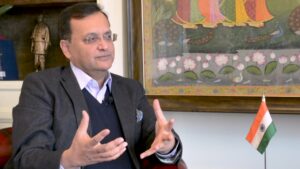 -Your Excellency, thank you very much for the interview. We have touched on all the points concerning India's geopolitics. Would you like to add anything else?
-Your Excellency, thank you very much for the interview. We have touched on all the points concerning India's geopolitics. Would you like to add anything else?
I'm very keen that India and Spain have a close relationship. We have a very good relationship, without any problems. But for me, it's important that Spain looks more at India.
Spain needs to understand that it's the future of the world is the Indo-Pacific. That everything is moving to the Indo-Pacific, and in the Indo-Pacific India is a very big player. If India and Spain can work together we can do a lot of things. I would like Spain to reach out more to India and the Indo-Pacific.
Right now Spain is constrained by Europe, not the Mediterranean, North Africa, and Latin America. Spain needs to look at that. We also need to see the importance of Spain in the European Union, where Spain plays a very important role. Spain is also a leader in infrastructure, renewable energy, agriculture production, in many other things which we are interested in. We are working together, but we need to work more.
 Copyright secured by Digiprove © 2023 Quixote Globe
Copyright secured by Digiprove © 2023 Quixote Globe
